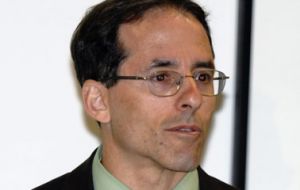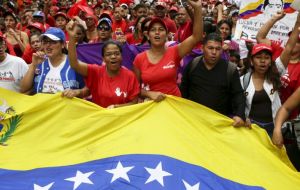MercoPress. South Atlantic News Agency
A range of possible results in Venezuela's Sunday legislative election
 A “unified” opposition might need as much as a 71.8% increase in votes over the 2010 elections, with government losing 10.8% of its votes to get a supermajority
A “unified” opposition might need as much as a 71.8% increase in votes over the 2010 elections, with government losing 10.8% of its votes to get a supermajority  “Media reports have so far been based on national polling, without any explanation of the system of representation” said CEPR Co-Director Weisbrot
“Media reports have so far been based on national polling, without any explanation of the system of representation” said CEPR Co-Director Weisbrot  Like the US and many other countries, Venezuela has a system of representation that gives disproportional representation to states with smaller populations
Like the US and many other countries, Venezuela has a system of representation that gives disproportional representation to states with smaller populations By David Rosnick (*) A new paper from the Center for Economic and Policy Research (CEPR) finds that there may be a significant disparity between the popular vote and legislative seats claimed by parties in Venezuela’s December 6 National Assembly elections.
The paper, “Projecting a range of possible results in the December 2015 elections for National Assembly in Venezuela”, by economist David Rosnick, finds that a wide range of outcomes are possible in the elections, based on current polling data and examines the impact of an inherent rural/small state advantage for the governing party coalition, and realigned party coalitions.
The paper finds, for example, that a “unified” opposition might need as much as a 71.8% increase in votes over the 2010 elections — with the government losing 10.8% of its votes at the same time — to get a supermajority, leaving the current government with just 55 seats.
“Media reports have so far been based on national polling, without any explanation of the system of representation,” said CEPR Co-Director Mark Weisbrot. “As a result, most people following the news would think that an opposition majority is inevitable, and a super-majority (60% or two-thirds) is likely. These results are possible, but by no means guaranteed, and we cannot even say how likely they are.”
The paper illustrates how the current government may benefit from a “rural and small-state advantage”: “It is important to understand that the difference between the percentage of the vote and the percentage of seats is not the result of ‘gerrymandering’ or any other manipulation of districts. Like the United States and many other countries, Venezuela has a system of representation that gives disproportional representation to states with smaller populations,” the paper says.
Since the Venezuelan government has a single chamber legislature with 167 seats, the disproportional representation of sparsely-populated or rural states is not nearly as large as in the United States, which has a Senate that allocates two seats to each state. But it is still significant in Venezuela’s National Assembly, and unlike the U.S., where rural areas are more conservative, in Venezuela they are more likely to vote for the left.
The paper simulates — based on the 2010 election results — the 2015 election under various assumptions regarding the government’s share of the vote and the degree to which the opposition is fractured among different coalitions. The projections look at the percent increase in votes the opposition would need in order to secure a simple majority, three-fifths, and two-thirds majority in the Assembly.
The paper notes that it’s the changed alignment of parties in its coalition that gives the government some advantage over 2010. But counteracting this is the government’s loss of support since then in nationwide polling.
“Unfortunately, there have been a lot of international attacks on the integrity of the voting system, and this could provoke instability or even violence depending on the electoral outcome,” said Weisbrot. This is especially true in light of the lack of understanding of how the system of representation works.”
(*) David Rosnick is an economist and researcher at the Center for Economic and Policy Research




Top Comments
Disclaimer & comment rules-

-

-

Read all commentsWe shall see what Maduro does when he loses.
Dec 05th, 2015 - 05:10 pm 0Blood in the gutters is my guess.
**
Dec 05th, 2015 - 05:27 pm 0Mark Weisbrot... the legendary champagne-socialist, comfortable arm-chair socialist 'renegade' commentator?
Former advocate, vociferous cheer-leader and massive supporter of Chavez, in the early years. He went very quiet on the subject a few years back when the dream began to unravel.
Just 'Google' Mark Weisbrot / The Guardian to see the timeline of his 'support' quietly dropping away over the 15 years of so-called 'revolution'.
Now he is back, subtly excusing away the gerrymandering of many districts.
The above article gives us ONE paragraph, on ONE possible interpretation, of which the original author, David Rosnick, says there are many.
Unfortunately, all else is totally overwritten by his own boss.
Smacks of Chavismo, no?
---------------
I have much more to contribute, regarding reports of Madurro's possible violent response to a MUD win in the AN; His family's exit planned exit routes and many other dodgy stuff they are up to.
I need to do some work now, but if anyone is interested, 'bump' this thread, and I will report back around 02:00 GMT
Ahh, the last day of this pathetic dictator, it will be fun to see him lose tomorrow.
Dec 05th, 2015 - 05:49 pm 0Commenting for this story is now closed.
If you have a Facebook account, become a fan and comment on our Facebook Page!